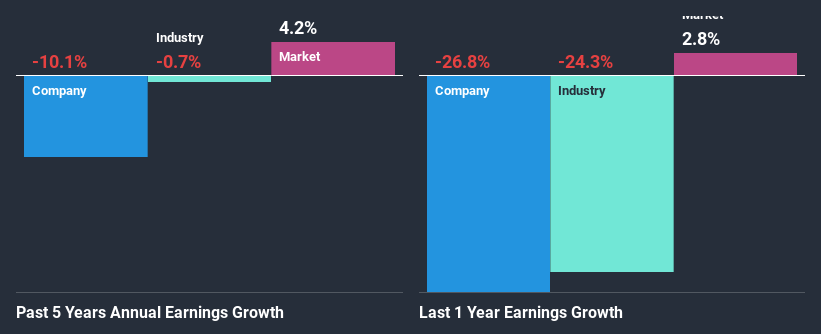- South Korea
- /
- Packaging
- /
- KOSDAQ:A115960
Yonwoo Co., Ltd's (KOSDAQ:115960) Stock is Soaring But Financials Seem Inconsistent: Will The Uptrend Continue?
Most readers would already be aware that Yonwoo's (KOSDAQ:115960) stock increased significantly by 41% over the past three months. However, we decided to pay attention to the company's fundamentals which don't appear to give a clear sign about the company's financial health. In this article, we decided to focus on Yonwoo's ROE.
Return on equity or ROE is an important factor to be considered by a shareholder because it tells them how effectively their capital is being reinvested. In other words, it is a profitability ratio which measures the rate of return on the capital provided by the company's shareholders.
View our latest analysis for Yonwoo
How To Calculate Return On Equity?
The formula for return on equity is:
Return on Equity = Net Profit (from continuing operations) ÷ Shareholders' Equity
So, based on the above formula, the ROE for Yonwoo is:
5.1% = ₩11b ÷ ₩217b (Based on the trailing twelve months to September 2020).
The 'return' is the amount earned after tax over the last twelve months. That means that for every ₩1 worth of shareholders' equity, the company generated ₩0.05 in profit.
What Is The Relationship Between ROE And Earnings Growth?
Thus far, we have learned that ROE measures how efficiently a company is generating its profits. Depending on how much of these profits the company reinvests or "retains", and how effectively it does so, we are then able to assess a company’s earnings growth potential. Generally speaking, other things being equal, firms with a high return on equity and profit retention, have a higher growth rate than firms that don’t share these attributes.
Yonwoo's Earnings Growth And 5.1% ROE
It is quite clear that Yonwoo's ROE is rather low. Not just that, even compared to the industry average of 6.4%, the company's ROE is entirely unremarkable. For this reason, Yonwoo's five year net income decline of 10% is not surprising given its lower ROE. We reckon that there could also be other factors at play here. For instance, the company has a very high payout ratio, or is faced with competitive pressures.
Next, when we compared with the industry, which has shrunk its earnings at a rate of 0.7% in the same period, we still found Yonwoo's performance to be quite bleak, because the company has been shrinking its earnings faster than the industry.

Earnings growth is a huge factor in stock valuation. It’s important for an investor to know whether the market has priced in the company's expected earnings growth (or decline). Doing so will help them establish if the stock's future looks promising or ominous. One good indicator of expected earnings growth is the P/E ratio which determines the price the market is willing to pay for a stock based on its earnings prospects. So, you may want to check if Yonwoo is trading on a high P/E or a low P/E, relative to its industry.
Is Yonwoo Efficiently Re-investing Its Profits?
When we piece together Yonwoo's low three-year median payout ratio of 13% (where it is retaining 87% of its profits), calculated for the last three-year period, we are puzzled by the lack of growth. The low payout should mean that the company is retaining most of its earnings and consequently, should see some growth. So there could be some other explanations in that regard. For example, the company's business may be deteriorating.
In addition, Yonwoo only recently started paying a dividend so the management probably decided the shareholders prefer dividends even though earnings have been shrinking. Our latest analyst data shows that the future payout ratio of the company is expected to drop to 9.1% over the next three years. Accordingly, the expected drop in the payout ratio explains the expected increase in the company's ROE to 8.7%, over the same period.
Conclusion
Overall, we have mixed feelings about Yonwoo. While the company does have a high rate of reinvestment, the low ROE means that all that reinvestment is not reaping any benefit to its investors, and moreover, its having a negative impact on the earnings growth. With that said, we studied the latest analyst forecasts and found that while the company has shrunk its earnings in the past, analysts expect its earnings to grow in the future. To know more about the latest analysts predictions for the company, check out this visualization of analyst forecasts for the company.
If you decide to trade Yonwoo, use the lowest-cost* platform that is rated #1 Overall by Barron’s, Interactive Brokers. Trade stocks, options, futures, forex, bonds and funds on 135 markets, all from a single integrated account. Promoted
New: Manage All Your Stock Portfolios in One Place
We've created the ultimate portfolio companion for stock investors, and it's free.
• Connect an unlimited number of Portfolios and see your total in one currency
• Be alerted to new Warning Signs or Risks via email or mobile
• Track the Fair Value of your stocks
This article by Simply Wall St is general in nature. It does not constitute a recommendation to buy or sell any stock, and does not take account of your objectives, or your financial situation. We aim to bring you long-term focused analysis driven by fundamental data. Note that our analysis may not factor in the latest price-sensitive company announcements or qualitative material. Simply Wall St has no position in any stocks mentioned.
*Interactive Brokers Rated Lowest Cost Broker by StockBrokers.com Annual Online Review 2020
Have feedback on this article? Concerned about the content? Get in touch with us directly. Alternatively, email editorial-team (at) simplywallst.com.
About KOSDAQ:A115960
Yonwoo
Yonwoo Co. Ltd, a packaging company, manufactures and sells cosmetic dispenser pumps for skin and personal care markets in Korea and internationally.
Excellent balance sheet and overvalued.
Market Insights
Community Narratives



